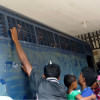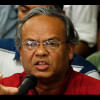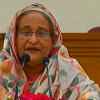Is the crackdown dousing fire with kerosene?
Secret killing was once a problem of the rich and famous, but the game has turned on its head in Bangladesh. Priests, teachers, bloggers, a barber, a grocer and a homeopath are amongst those who have been assassinated in this country in the past few months. Throughout history, ordinary people have been victims of famine, pestilence, genocides and massacres, but almost never singled out for target killings as individuals out of political interests. For the first time, we are having a phenomenon when the "little" guys are being sacrificed on the altar of a supposedly "grand" design.
Many times in history, one man's death has had momentous effects on the course of events. A group of six assassins killed Archduke Franz Ferdinand of Austria in Sarajevo on June 28, 1914, starting a chain reaction that culminated in World War I. The murder of Julius Caesar sparked a cycle of civil war in Rome resulting in one of the most significant constitutional transformations in history when the republican system of government became an empire. The American people still believe that their history could have taken different turns if not for the assassinations of John F. Kennedy, his brother Robert Kennedy, and Civil Rights leader Martin Luther King, Jr.
While Bangladesh politics is still reeling under the impacts of its two assassinated presidents, a fresh assassination spree in the last one year and a half has been most extraordinary in its selection of ordinary targets. The victims come from diverse religious and professional backgrounds. Most of them were hacked to death for reasons known to their killers only. None of them was politically involved. None of them was wealthy or famous by any standard. Except for the bloggers, none of them is known to have harboured radical political or religious beliefs.
In a grisly way, these serial murders symbolise yet another phase in the death of democracy. If people are afraid to speak and are denied their right to vote, they're now being killed to prove that they're also dispensable. It could be a telltale sign in an attempt from all quarters to silence the people so that they know that the public doesn't matter in the affairs of this republic. It also could be a harebrained scheme of the killers to scare the people that if they didn't fight for their 'rights', they would be dead as well.
Political scientists David Laitin and James Fearon of Stanford University studied 122 civil wars raged between 1945 and 2002. They claimed that the standard rebel tactic is to provoke indiscriminate retaliation by the government in order to help rebels recruit more sympathisers to their movement. One of the dangers of crackdowns on insurgents or militants is that it often douses fire with kerosene.
Many insurgencies are born as ideas whose time has come. That was how nomadic rebels were able to bring down the Roman Empire. In what's called the origin of guerilla warfare and terrorism, the Akkadian empire was dismantled in the 22nd century BC. Nations struggling with insurgencies have always faced this dilemma. Excessive force used to quell insurgents often backfired and toppled governments. Again, leniency is misread as sign of weakness, and encourages insurgents to go on fighting.
Does Bangladesh have the capacity to fight terrorism? A recent report of The Washington Post claims that it takes at least 20 staffers to monitor one terror suspect. Does the government know how many terror suspects are out there in the country? Does it have sufficient number of law enforcement headcounts to go after these suspects if they keep spawning?
The ongoing crackdown is only rounding up hundreds of men every day with the jest of fishermen dragging a river. But can the numbers deliver the results, because a crackdown works like stray bullets having the greater chance of missing than hitting the targets? If all of those detained are involved indeed, then the spectre of terrorism looms larger than we think.
The crackdown is reportedly an open season to hunt down the opponents, and apparently to make money. But the most important question is whether it's crushing the militants. Or, is it creating more sympathisers for them?
The American military historian Max Boot argues in his book, Invisible Armies: An Epic History of Guerrilla Warfare from Ancient Times to the Present, that between 1775 and 1945 about a quarter achieved most or all of their aims. Since 1945, that number has risen to 40 percent. Part of the reason for the improving success rate is the rising importance of public opinion.
What we're watching is a custody battle between two parents. The disciplinarian one is reluctant to give people much freedom. The psychotic one is killing them to make an elusive point. The crackdown is comparable to domestic violence in a house where the public opinion is a frightened child hiding in the closet.
The writer is the Editor of weekly First News and an opinion writer for The Daily Star. Email: [email protected].

 For all latest news, follow The Daily Star's Google News channel.
For all latest news, follow The Daily Star's Google News channel. 







Comments